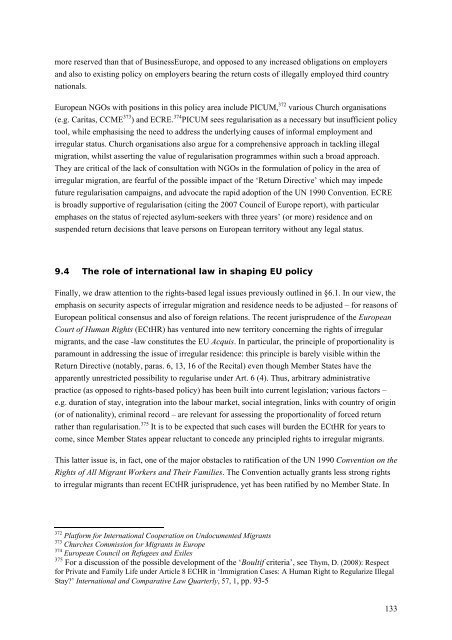REGINE Regularisations in Europe Final Report - European ...
REGINE Regularisations in Europe Final Report - European ...
REGINE Regularisations in Europe Final Report - European ...
You also want an ePaper? Increase the reach of your titles
YUMPU automatically turns print PDFs into web optimized ePapers that Google loves.
more reserved than that of Bus<strong>in</strong>ess<strong>Europe</strong>, and opposed to any <strong>in</strong>creased obligations on employers<br />
and also to exist<strong>in</strong>g policy on employers bear<strong>in</strong>g the return costs of illegally employed third country<br />
nationals.<br />
<strong>Europe</strong>an NGOs with positions <strong>in</strong> this policy area <strong>in</strong>clude PICUM, 372 various Church organisations<br />
(e.g. Caritas, CCME 373 ) and ECRE. 374 PICUM sees regularisation as a necessary but <strong>in</strong>sufficient policy<br />
tool, while emphasis<strong>in</strong>g the need to address the underly<strong>in</strong>g causes of <strong>in</strong>formal employment and<br />
irregular status. Church organisations also argue for a comprehensive approach <strong>in</strong> tackl<strong>in</strong>g illegal<br />
migration, whilst assert<strong>in</strong>g the value of regularisation programmes with<strong>in</strong> such a broad approach.<br />
They are critical of the lack of consultation with NGOs <strong>in</strong> the formulation of policy <strong>in</strong> the area of<br />
irregular migration, are fearful of the possible impact of the ‘Return Directive’ which may impede<br />
future regularisation campaigns, and advocate the rapid adoption of the UN 1990 Convention. ECRE<br />
is broadly supportive of regularisation (cit<strong>in</strong>g the 2007 Council of <strong>Europe</strong> report), with particular<br />
emphases on the status of rejected asylum-seekers with three years’ (or more) residence and on<br />
suspended return decisions that leave persons on <strong>Europe</strong>an territory without any legal status.<br />
9.4 The role of <strong>in</strong>ternational law <strong>in</strong> shap<strong>in</strong>g EU policy<br />
F<strong>in</strong>ally, we draw attention to the rights-based legal issues previously outl<strong>in</strong>ed <strong>in</strong> §6.1. In our view, the<br />
emphasis on security aspects of irregular migration and residence needs to be adjusted – for reasons of<br />
<strong>Europe</strong>an political consensus and also of foreign relations. The recent jurisprudence of the <strong>Europe</strong>an<br />
Court of Human Rights (ECtHR) has ventured <strong>in</strong>to new territory concern<strong>in</strong>g the rights of irregular<br />
migrants, and the case -law constitutes the EU Acquis. In particular, the pr<strong>in</strong>ciple of proportionality is<br />
paramount <strong>in</strong> address<strong>in</strong>g the issue of irregular residence: this pr<strong>in</strong>ciple is barely visible with<strong>in</strong> the<br />
Return Directive (notably, paras. 6, 13, 16 of the Recital) even though Member States have the<br />
apparently unrestricted possibility to regularise under Art. 6 (4). Thus, arbitrary adm<strong>in</strong>istrative<br />
practice (as opposed to rights-based policy) has been built <strong>in</strong>to current legislation; various factors –<br />
e.g. duration of stay, <strong>in</strong>tegration <strong>in</strong>to the labour market, social <strong>in</strong>tegration, l<strong>in</strong>ks with country of orig<strong>in</strong><br />
(or of nationality), crim<strong>in</strong>al record – are relevant for assess<strong>in</strong>g the proportionality of forced return<br />
rather than regularisation. 375 It is to be expected that such cases will burden the ECtHR for years to<br />
come, s<strong>in</strong>ce Member States appear reluctant to concede any pr<strong>in</strong>cipled rights to irregular migrants.<br />
This latter issue is, <strong>in</strong> fact, one of the major obstacles to ratification of the UN 1990 Convention on the<br />
Rights of All Migrant Workers and Their Families. The Convention actually grants less strong rights<br />
to irregular migrants than recent ECtHR jurisprudence, yet has been ratified by no Member State. In<br />
372 Platform for International Cooperation on Undocumented Migrants<br />
373 Churches Commission for Migrants <strong>in</strong> <strong>Europe</strong><br />
374 <strong>Europe</strong>an Council on Refugees and Exiles<br />
375 For a discussion of the possible development of the ‘Boultif criteria’, see Thym, D. (2008): Respect<br />
for Private and Family Life under Article 8 ECHR <strong>in</strong> ‘Immigration Cases: A Human Right to Regularize Illegal<br />
Stay?’ International and Comparative Law Quarterly, 57, 1, pp. 93-5<br />
133
















